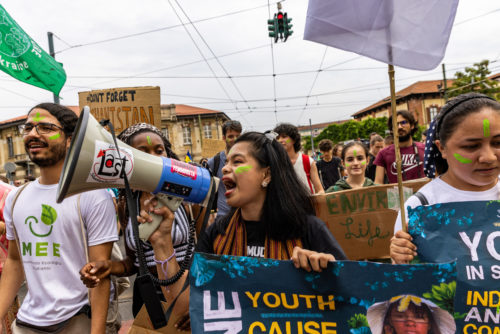On human rights consistent climate action in 2024
First published: here | October 23, 2024
This document provides recommendations for parties to the UN Framework Convention on Climate Change (UNFCCC) and to the Paris Agreement which would help put human rights front and centre of all climate action and decision making at COP29 in Baku, Azerbaijan in November 2024. It updates an earlier version published in May 2024.
To do so will result in more effective and more sustainable outcomes; remedies for unavoidable harms; reductions in historic inequalities often stemming from racist and colonial legacies; and will point the way towards climate justice. A massive scale up of climate finance in line with the polluter pays principle and the obligation to provide international cooperation and assistance together with global tax reform and debt restructuring is key to this transformation and is the collective focus of the climate justice movement, of which Amnesty International is part, ahead of COP29 – dubbed by some as the “finance COP”.1
Key human rights messages for climate action in 2024
- There is no climate justice without human rights. Put human rights at the heart of all climate action decision making to ensure a rapid, equitable and just transition to zero carbon economies that reduce inequalities between and within countries.
- All states in a position to do so must massively scale up needs-based climate finance, particularly for adaptation and loss and damage, in the form of grants, not loans, with those most responsible for emissions contributing the most.
- Agree a minimum of USD 1 trillion for the NCQG, with sub-goals on mitigation, adaptation, and loss and damage. o Provide adequate capitalization based on the polluter pays principle for the Fund for responding to Loss and Damage to enable affected people in lower income countries to effectively access resources.
- Ensure provision of adequate finance for all aspects of just transition.
- Equitably transform global systems of development finance, taxation, and public and private investment.
- Ensure debt restructuring for countries that need it.
- Commit to a full, fast, fair, and funded fossil fuel phase out across all sectors, without relying on risky and unproven technologies or offsets that do not lead to genuine emissions reductions.
- Develop new human rights compliant NDCs that will keep global warming below 1.5°C above pre-industrial levels, with high income historical emitters, other high emitting G20 countries, and other high income fossil fuel producers going furthest and fastest.
- Protect civic space, including at UNFCCC meetings, for civil society, children and youth, women, people with disabilities and Indigenous Peoples from all countries, including Azerbaijan, where freedoms of expression, association and peaceful assembly are severely restricted.
- All states must press for respect for freedom of expression and peaceful assembly in all UNFCCC meetings, as well as meaningful improvements in the human rights situation in the United Arab Emirates, the outgoing president and in Azerbaijan ahead of COP29.
- Host countries and the UNFCCC Secretariat must routinely publish Host Country Agreements swiftly after signing.
1 Economist Impact, “What next for climate finance?”, 13 February 2024, https://impact.economist.com/sustainability/net-zero-and-energy/what-next-for-climate-finance

